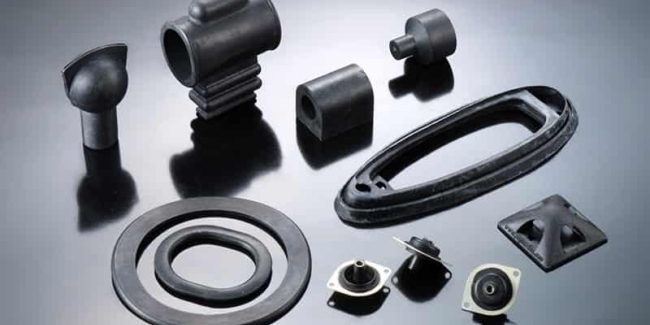Rubber Mouldings

Rubber Mouldings
Where applications require a very bespoke seal or gasket, such as where there is a very awkward space or shaped product which requires sealing or covering. Advanced Seals & Gaskets work with a wide network of material manufacturers, enabling us to be able to supply a vast range of complex rubber mouldings made from different types and grades of rubber including solid commercial rubber.
A moulding requires specialist machinery for the process (compression, transfer or injection moulding) as they are generally bespoke shapes, with complex profiles, have a ribbed finish or may require a lip or curved edge - for these reasons mouldings can not simply be pressed from sheet material. All our commercial rubber mouldings are made to order and are produced by following samples or CAD drawings provided by customers, from which a tool or moulded cavity is made. Mouldings can take many forms for example feet, buffers, sleeves and o-rings to name a few, all designed to provide protection, prevent the leakage or ingress of air, fluid or gas and to be aesthetically pleasing.
Product Enquiry
For information on Rubber Mouldings please complete the following quick enquiry or call us on +44(0)1384 252555.
Key Characteristics
- Colour: black
- Temperature: -20°C up to +70°C.
- Density: 60-70 shore A
- Resistances: water, oxidation, acids, alkali, gases
Offers good resistance to abrasion
Full technical data can be supplied upon request.
What are Solid Commercial Rubber Mouldings?
Solid Commercial Rubber (SBR styrene-butadiene rubber) is an economy grade material, black in colour which has a higher wear resistance compared to solid natural rubber and remains flexible even at low temperatures. SBR rubber mouldings can be made with the addition of different polymers mixed into the compound such as neoprene (NR/SBR), EPDM and Nitrile (NBR/SBR) which are intended to improve or add additional properties, and in a range of hardnesses of 60, 65 and 70 shore A. ‘Moulding’ is the procedure by which raw material, in this case plastic or rubber is turned into a specific shape and usable product using 1 of 3 processes:
INJECTION MOULDING - the process by which raw/uncured material heated until moulton and then fed through a nozzle into a mould. Pressure and heat levels are adjusted within the cavity causing the material to ‘cure’ and the moulded product is formed.
COMPRESSION MOULDING consists of a top and bottom pre-heated steel mould/cavity into which raw material is poured in and the two halves are closed together. This tool is heated and the material melted creating the desired shape and the final product. Although this process is great for bespoke moulding, it can be very time consuming for high volume production.
TRANSFER MOULDING is a more complex process, where raw/uncured material is loaded into the transfer pot and heated, a plunger slowly enters the pot building pressure, forcing the melted rubber through the sprue or channel leading to the mould/cavity. Once the mould is filled, the raw material forms the desired shape and is cured before the moulding is removed.
Why use Solid Commercial Rubber Mouldings?
Mouldings made using Commercial rubber are often taken as a low cost, general purpose material with high tensile and impact strength, resistance to abrasion and flexibility even at low temperatures. Solid commercial rubber mouldings can be used within a temperature range of between 70℃ to -20℃ and have good resistance to water, but are not suitable for applications involving chemicals, ozone, very strong acids, grease, fat oils and hydrocarbons.
Commercial rubber mouldings are ideal for customers who are looking for a non-standard profile to fit specific applications, the process of producing a moulded part means the customer is guaranteed to have an identical product each time, which is essential for high volume production and assembly.
SBR mouldings can be made in a ‘solid’ shape such as cord, or ‘hollow’ where the moulding is empty and produced with just an outer wall. The types of mouldings available are endless as they can be used in practically every industry, some examples of mouldings include rubber sleeves, rubber bellows (coverings), rubber feet, buffers, remote and console buttons and parts for sports equipment such as bike pedals and handle bar covers.
Grades of Commercial Rubber Available
Advanced Seals & Gaskets work with many material manufacturers which gives our customers more choice. Commercial rubber is not only available as an SBR grade, but also blended with other polymers to give a cheaper alternative, some of these blends include:
CR/SBR (neoprene) is manufactured using neoprene rubber and SBR compounds to create a material with properties of premium grade material at a reduced cost. This material is generally used for gap sealing and dust seals. Commercial grade neoprene offers resistance to oils, grease, dilute acids and alkalies and are hard wearing enough to be used outdoors.
NBR/SBR (Nitrile) is manufactured using nitrile rubber and SBR compounds to create a material suitable for general purpose gasketing. This commercial grade rubber offers resistance to fuels, petroleum, oils and many solvents making it suitable for use within a variety of industrial applications.
EPDM/SBR rubber is another hybrid made up of 2 different compounds. This particular grade of material offers good resistance to weathering and Ozone deterioration and provides properties such as a high tensile strength and tear resistance. Commercial grade EPDM rubber is typically used for applications such as pipe seals, weather strips and dust seals.
Benefits of Commercial Rubber
- Excellent resilience and tensile strength
- Excellent seal against air, water and diluted mixtures
- Temperature: -20°C up to +70°C.
- Abrasion resistance
- Excellent impact strength
Please contact us using the form below or by calling us on +44(0)1384 252555.





















